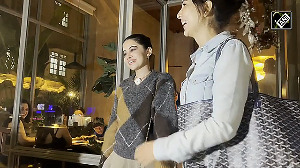 Ranjita Ganesan finds out why an Akola businessman paid Dharma Productions for two tickets of Ae Dil Hai Mushkil.
Ranjita Ganesan finds out why an Akola businessman paid Dharma Productions for two tickets of Ae Dil Hai Mushkil.
In a version of advance booking, an Akola-based businessman paid Dharma Productions for two tickets of Ae Dil Hai Mushkil well ahead of the film's release. But he has no real plans of watching it.
He says so clearly in a letter to director Karan Johar accompanying a compensatory cheque for Rs 320, the amount he reckons he would have spent at the multiplex with his wife.
This was in direct response to a video appeal Johar issued recently to make the case for his film's release.
Johar's venture features Pakistani star Fawad Khan, and such Indian projects have been a bone of contention at a time of conflict between the two countries.
When some groups, including the Maharashtra Navnirman Sena, called for a ban, the state government mediated a deal where filmmakers like Johar can release their movies if they pay Rs 5 crore (Rs 500 million) to the Indian Army's welfare fund and display a slate paying tribute to Indian soldiers at the start of the film.
Karan K Cheema, 33, says his action was an impulsive protest mixed with some sympathy.
He has been disappointed with Bollywood's attitude towards the country's fight with Pakistan ever since actor Om Puri made a comment that Indian soldiers had not been forced to join the army.
Johar's appeal -- where he said a ban would affect some 300 Indians who worked on the film -- felt forced, according to him.
The real reason Khan was cast was not because he is better than Indian actors, but because he would ensure the film's success in Pakistan too, Cheema guesses.
'I indeed feel so squeamish that because of some extra personal profits we encourage and cast Pakistani artists in Bollywood,' he wrote to Johar, adding with certainty, 'Anyway, none of us are interested in watching your movie anymore as it casts the neighbouring enemy country's citizen for self motive not even considering we have thousands of our own citizens who keep struggling (sic).'
As a businessman, however, he felt compassion for the potential financial losses and sent in a monetary contribution.
He shared the letter with friends and groups on WhatsApp as an example, urging others to follow.
News of this reportedly went viral after Shilpi Tewari, a former Bharatiya Janata Party volunteer, posted it on Twitter.
Cheema says he never meant for this to happen. He speaks over the phone, but is reluctant to reveal much, worrying his actions will be construed as a publicity stunt.
Dharma Productions did not respond to the gesture, and he does not expect it will.
Cheema's family has long been in the sports equipment industry.
In Akola, he says he occasionally supports issues such as child rights, and banning the use of plastic.
Bollywood in the 1960s and 1970s was more responsible, in his opinion. Since then, there has been erosion in general in pride about being Indian, says Cheema.
His idea of nationalism is not sloganeering or "candy-floss patriotism," he is quick to state, but "being a good citizen and a good human being."
When he recently travelled to countries like Greece, he was struck by their sense of discipline and national pride.
"As several members of his family have been in the armed forces," Cheema says, "If the country needed me, I would close my shop and go."













 © 2025 Rediff.com -
© 2025 Rediff.com -